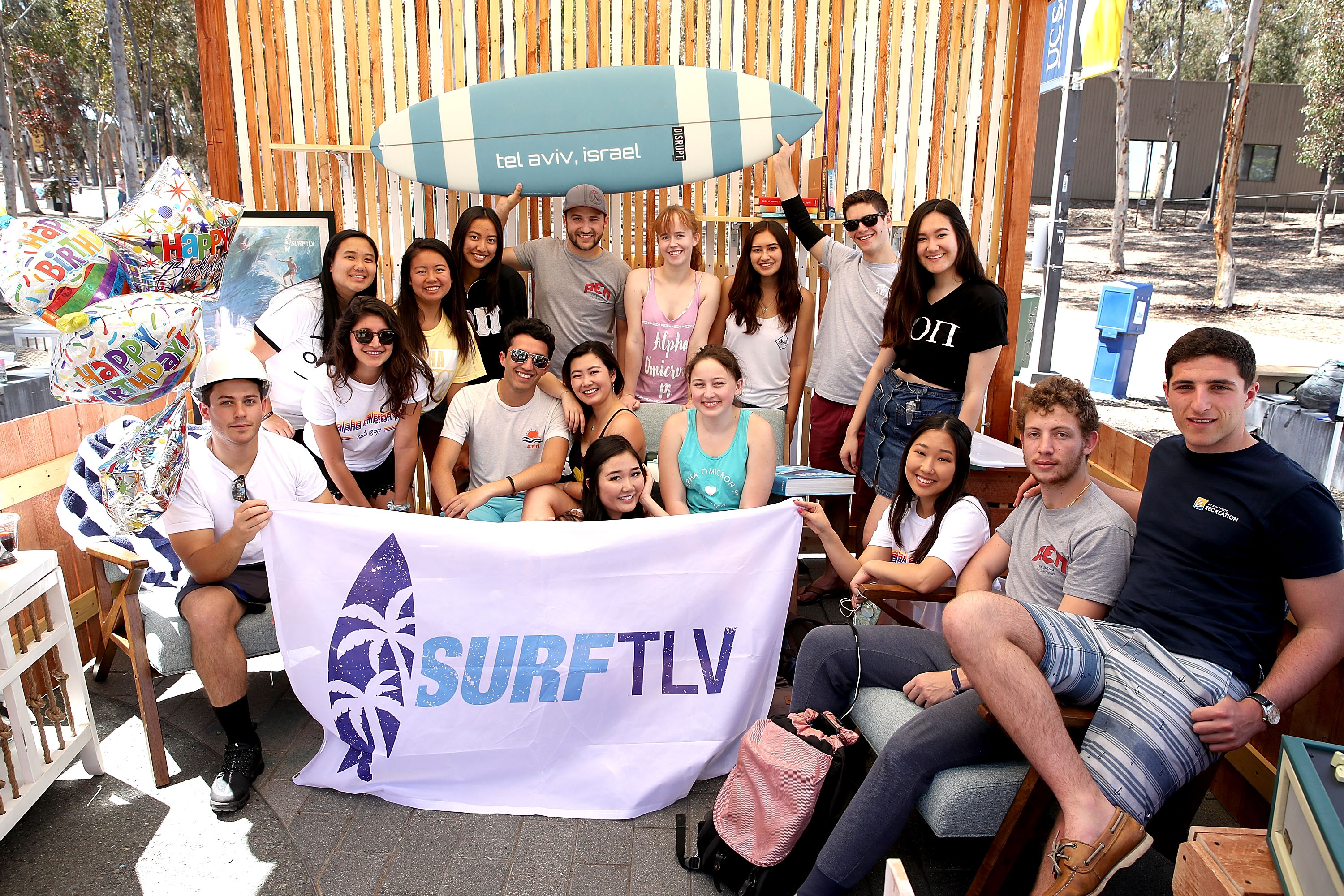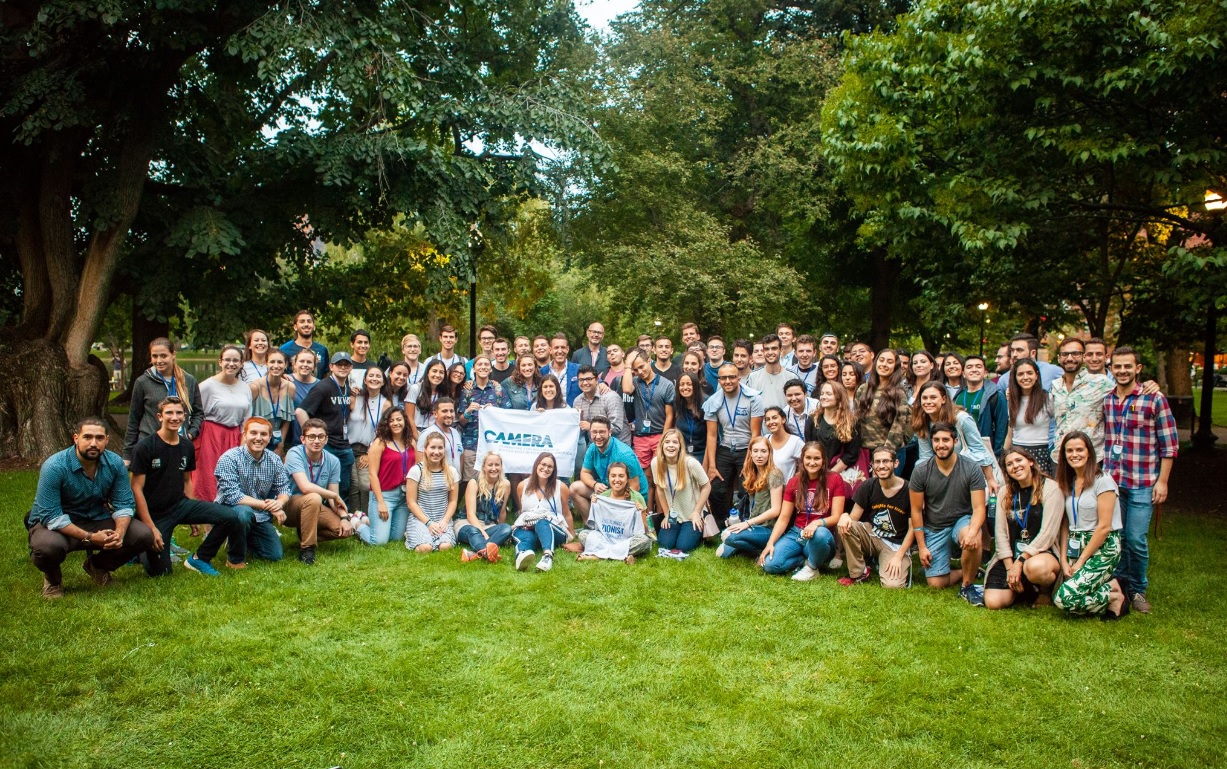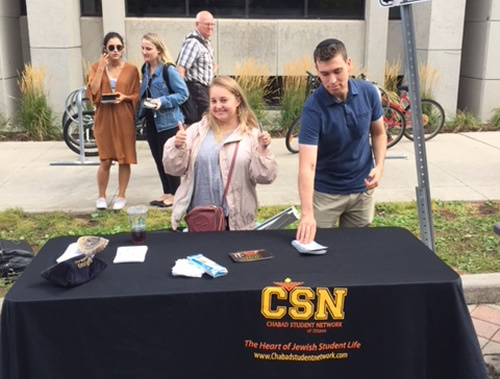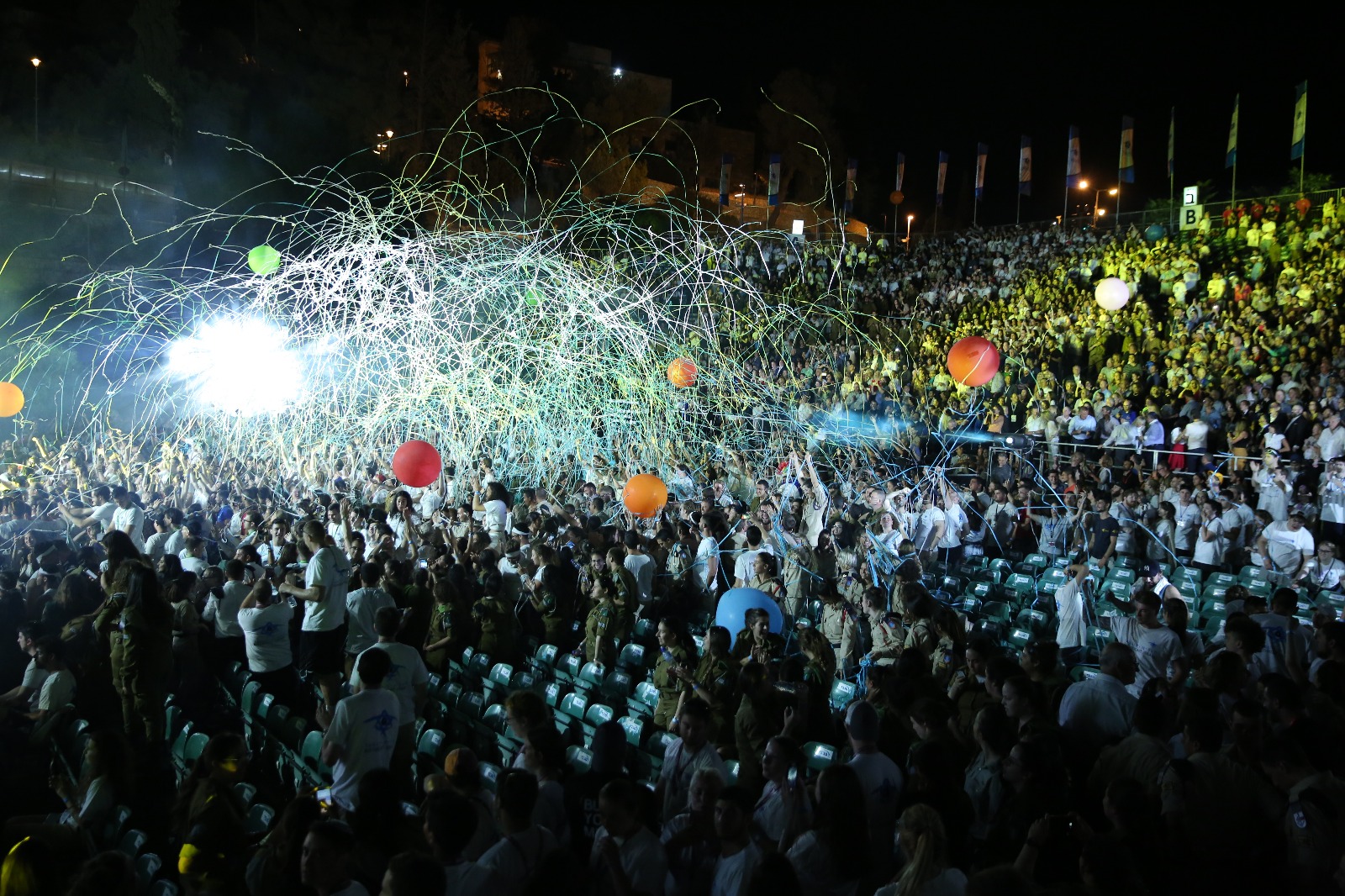
Crisis on campus: A new generation of galvanized young Jews learns how to fight anti-Semitism
Equipping a cadre of students with debating tools, historical information, legal support, trips to Israel and more, so that Israel has a place on the university playing fields.
(September 6, 2018 / JNS) IfNotNow has a plan. It’s determined, according to its website, to create nothing less than “a movement led by young Jews to reclaim the mantle of Jewish leadership from the out-of-touch establishment.” Or, more specifically, to be “the generation to end our community’s support for the occupation.”
Since the term “occupation” is increasingly equated with the very existence of the State of Israel, these words written by young Jews are chilling to many for whom Israel is at the very least a safety net preventing future Holocausts, and at its height the answer to a prayer by generations of Jews who never had the opportunity to find life-saving sanctuary within its borders.
With a 2016 Pew Research Center report showing 27 percent of American young adults siding with the Palestinians versus 9 percent a decade earlier, the Anti-Defamation League (ADL) reporting a 57 percent climb in reports of anti-Semitism in the United States, including physical attacks and vandalism, last year not one of the 50 states escaped anti-Semitic incidents, many of them on college campuses.INN is not a lone gunman, but it’s emblematic of the explosive growth of the anti-Israel forces on American campuses—one that threatens to take more prisoners as school starts up again. Forces that include not only student groups funded by Arab and Arab sympathizing groups and anti-Israel faculty, many of whose salaries are paid by funded chairs that often bring millions into a university’s coffers.
Meanwhile, with many of its children and grandchildren hesitating to wear a Jewish star or an Israel Defense Forces’ sweatshirt for fear of verbal or physical attack, and many others joining their friends’ and professors’ demonization of Israel, the Jewish world appears to be slowly awakening from its slumber determined to stem the onrushing tide. And a new generation of strong Jews is beginning to emerge forged by the fire.
Determined not to leave Jewish students (and Israel itself) undefended on campus, organizations can be seen spread between three “battalions”:
- Information, Organization and Legal Support
Here are some key players, in alphabetical order:
AIPAC. Known for training college students on the intricacies of Israel’s history and current situation, the organization supports efforts on campus to advocate for Israel as part of “building broad coalitions in support of the U.S.-Israel relationship.” Its underlying focus is on “the values of human dignity and freedom shared by our two sister democracies.”
Alpha Epsilon Pi (AEPi). The largest international Jewish fraternity makes it a point to “create a pro-Israel presence,” says Israel department head Julian Markowitz. One potent defense against the BDS movement: encouraging the brothers to run for student government, where they can campaign and vote against it from the inside. “I never expected the magnitude here at Cornell [University in Ithaca, N.Y.],” says incoming senior Jay Sirot. “There was a huge BDS campaign during Pesach and groups of professors in the middle of campus criticizing Israel—a long list of them signed a violently anti-Israel letter in the paper. A pro-Israel stance separates you socially, and if your professors are against it, it’s uncomfortable to be for it. But anti-Israel forces can only win if open dialogue is shut down. That’s why we create opportunities for honest discussion and hearing both sides.”

Alums for Campus Fairness (ACF). A little-recognized force for helping students caught in the crosshairs of anti-Israel forces is a school’s alumni base, according to ACF executive director Avi Gordon. “We hear from countless students on our 25 campuses who are bullied for defending Israel, and we believe that by creating a unified alumni voice, they’ll know they’re not alone.” With schools relying on alumni for financial support and their reputation, Gordon adds that “alumni, including the 700 in our UCLA chapter, and a real anti-Israel environment can be the added pressure a school needs to tip the balance to reject BDS and stop the demonization of Israel.”
One fly in the alumni ointment, argues Hamilton College history professor and Alexander Hamilton Institute for the Study of Western Civilization director Robert Paquette, “is that multi-million dollar endowments by Arabs and their sympathizers can render colleges immune to pressure from outside, including their alumni.”
AMCHA Initiative is a watchdog with eyes and ears trained on campuses across North America. Known best for its studies of BDS and other anti-Israel activities, AMCHA is also committed to “defend and protect Jewish students from anti-Semitic harassment on campuses,” says executive director Tammi Rossman-Benjamin. “We want to ensure they can express their identity safely and let them know we have their backs.”
Anti-Defamation League (ADL)’s slice of the campus-advocacy pie may be its interaction with administrations (as in a recent communications with Stanford University in Palo Alto, Calif., following a student resident advisor’s online attack on Jewish students), as well as training campus police to handle anti-Israel and anti-Semitic violence. In addition, the ADL distributes a video “tool kit” for students and parents, featuring students who share their encounter with anti-Israel bias on their campuses, their reactions and how they dealt with it. (See: https://www.adl.org/think-plan-act)
CAMERA, long known as a tireless media watchdog, now brings its expertise to campus with their training program and the dozens of CAMERA Fellows monitoring their campus media, writing op-eds and coordinating programs with other pro-Israel groups. “We go where there is a need,” said CAMERA executive director Andrea Levin. “With a focus on where there’s weak or underfunded pro-Israel structure—or none at all—and the students need support the most.”

Maccabee Task Force (MTF), formerly Campus Maccabees, is focused on building strong coalitions to defeat BDS and other expressions of anti-Israel bias wherever and whenever it raises its head. Funded largely by Sheldon and Miriam Adelson, MTF comes onto each of the 40 campuses with an open mind. “Our job is to listen to the students and the players,” says executive director David Brog. “Then we can help devise a comprehensive strategy—not just a few one-off events—tailored for the realities on the ground there and provide the resources they need to do the job. We then share each success with other schools that might be able to benefit.”
Lawfare is a pro-Israel litigation fund providing pro bono legal services by the 350 lawyers in their network for those dealing with anti-Semitism. And founder and executive director Brooke Goldstein says that Lawfare is increasingly called upon to provide legal services and support to defend Jewish college students against harassment and discrimination. “For too long, the Jewish community has not organized itself to provide basic legal services to Jewish students harassed on campuses,” she says, adding that in their suit against San Francisco State University, for instance, they made the case that “Jewish students have a basic civil right to attend federally funded schools absent unlawful harassment and discrimination … we do everything in our power to defeat this kind of hatred in courts of law.”
StandWithUs (SWU), now in its 18th year of supporting Jewish students and defending Israel, finds itself in increasing demand during this time of mounting tensions on campus. Its Emerson Fellows on 90 campuses bring their peers up to speed on the history and role of the Jewish state, and combat BDS whenever it comes up. SWU also trains high-schoolers each summer to prepare them for the challenges they’re likely to face in college regarding Israel. One focus: how to tell when legitimate criticism of Israel crosses the line into anti-Semitism. “When I saw the first anti-Israel rally at my school, I felt confused and kind of alone,” says Ron Krudo. “But I was lucky; I found a Hillel Israel table and said, ‘Yes, I want to get involved.’ ” Six years later, Krudo heads up SWU’s campus affairs department, where he has a panoramic view of the campus scene and oversees SWU efforts “to proactively share Israel’s story and combat anti-Israel rhetoric. … We work with the students so they aren’t bullied by their anti-Israel professors and friends who are determined to erode support for Israel. A Jewish student who hears someone accusing Israeli soldiers of shooting Arab children needs to be able to counter with the IDF’s code of not shooting defenseless civilians.”
Zionist Organization of America as ZOA Campus works with students on 120-plus campuses across the United States, bringing in speakers, mentoring students and running student leadership missions to Israel. The ZOA’s Center for Law and Justice advocates for Jewish students who face harassment and discrimination on their campuses, including a groundbreaking civil-rights action on behalf of Jewish students following years of harassment at the University of California, Irvine, and has been working on passing other protective legislation.
- Strengthening Jewish Knowledge and Identity
A second battalion follows the reasoning that a student who’s strong and secure in his or her Jewish identity—and carries the mantle of Jewish history, tradition and destiny—is more likely to see supporting Israel as an integral part of their Jewish sense of self.
Hillel. Marching in all three battalions is Hillel, the world’s largest Jewish student organization, with a presence on 550 campuses across North America. “We work closely with a wide range of partners, but we’re also the hub of the wheel, pulling together students from around campus,” says spokesman Matthew Berger. Maintaining that Hillel is “not just about responding to anti-Israel attacks, but about year-round advocacy from the moment they arrive on campus,” Berger adds that Hillels do typically find themselves in the center of the fight against BDS. “Even more important, we engage Jewish students and instill an understanding of the true Israel—her culture, people, values and history. That’s the most effective tactic for fighting the misinformation and the hate.”
Chabad. With Chabad on Campus centers on 265 campuses in North America, the international Chabad-Lubavitch movement impacts thousands of college students each year. Rabbi Chaim and Yocheved Boyarsky’s home, for instance, is open to the 700 Jewish students at the University of Ottawa. It also serves as informal war room during the school’s BDS campaigns, most recently in March. “All three times they tried to pass it here, many professors were outspoken against Israel, and our students were badly shaken. They saw it as a serious threat to Israel, themselves and Jews in general,” says the rabbi. “And though in the end we’ve able to defeat it, each time it’s a struggle.” Standing up for Israel’s right to exist and defend itself is “a byproduct of what Chabad does on campus,” he adds. “The stronger a student feels about being a Jew, the stronger their love for Israel. It’s that simple.”

Jews for Judaism is, though much smaller than Chabad, also working on the level of strengthening Jewish students’ love for Israel by building strong Jewish identities. The Los Angeles-based Rabbi Zalman Kravitz got his start fighting against those who missionize Jews. Now, working with bigger campus entities like Chabad and Hillel, “we connect students to an experiential Judaism, and build the critical thinking skills and confidence to challenge accusations with smart questions. When students begin to feel the connection, they’re empowered against attacks on Israel and against missionaries, and they have a tool for life.”
Meor. Jewish education is the way into the Jewish student’s heart and mind for this organization, funded in large part by Olami. “It’s a dangerous formula of one-part liberal notion of victimhood, one-part propaganda and misinformation, and one-part idealistic young people,” says Rabbi Ari Koretzky, who is at the University of Maryland in College Park, Md., one of 20 to have a Meor rabbi on campus. “Jewish education is our real mandate, customized for each student’s background,” he says. “We make sure we support the pro-Israel community, especially in times of BDS, but our basic premise is that by learning Jewishly, you fortify that Israel matters in the broader context of Jewish life and identity.”
- Let Them Breathe Israeli Air: Sending Them on Transformational Journeys
With an understanding that a personal experience can turn Israel from theory to reality and is more powerful than fighting hate with facts, many organizations are sending Jewish students, and increasingly, non-Jewish ones as well, to Israel.
Birthright Israel. Over the past 18 years, Birthright Israel has provided free trips to Israel for a whopping 650,000 Jewish young adults with the $3,000 per-traveler cost covered by donors committed to growing the next generation’s connection to Israel. Many students go on the classic 10-day experience, whereas others choose to follow a special interest, such as active (hiking and climbing, etc.), spiritual, professional, or gay and lesbian culture. (There is also an annual trip for young adults with disabilities.) These specialty Birthrights bring together young Jews who share a passion and, when they succeed, forge a strong bond with Israel both as a country and a people. “Our aim is for participants to become more engaged in Jewish life after the trip, whether through on-campus activities, community groups or even return trips to Israel,” they say in a statement. And, they add, research shows “that participants return home with a better understanding of Israeli society and their own Jewish identity, and feel more comfortable discussing these topics.”
Other Israel experiences vary in length of time, as well as scope and focus. Such programs as MASA match a student with an internship, volunteer job or course of study, as does Onward Israel, often considered a next-step for Birthright returnees hungry for further engagement with Israel.

Over the last 17 years, Hasbara Fellowships, a project of Aish HaTorah, has flown thousands of students to Israel. There they’re trained to be peer educators about Israel when they get back on campus. And each year, TAMID sets up hundreds of business students in summer internships at leading Israeli companies.
“From what I’ve seen this summer, the success of the business community in this little country is astounding—almost a miracle,” said TAMID traveler Columbia University junior Sophia Danzig in the final days of her internship at a Tel Aviv venture-capital firm. “Even though there is a lot of anti-Israel stuff going on my campus, I realized this summer that the people who want to invest in Israel are so much more influential than the ones who want to divest, with companies like Google and Toyota lining up for Israel’s technical know-how.”
Increasingly SWU, Maccabee Task Force and AIPAC are leading trips of mostly non-Jews, including student government reps. Maccabee Task Force for instance took 746 mostly non-Jewish leaders from campuses facing the worst anti-Israel pressures to Israel on dozens of trips. Included were student leaders from African-American, Hispanic and Asian-American groups, along with gays and lesbians—groups that are often themselves marginalized and have historically joined campus anti-Israel coalitions.
“Even the most skeptical among them returned from Israel opposed to the BDS movement’s simplistic scapegoating of Israel,” says MTF chief Brog. “And many of these leaders acted on what they learned by working to oppose BDS at critical junctures upon their return.”
Fighting for Our Generation: Students Standing Up for Israel and Jewish Peoplehood
For Ross Beroff, who just graduated in finance and political science from Northeastern University in Evanston, Ill., the most fulfilling moment of his years on campus had nothing to do with academic achievement. It was when he led the battle cry against the BDS referendum.
“There were a lot of one-on-one conversations and lobbying and telling Israel’s story, and explaining the harm that BDS could do,” he says. “Since I was a senator on the student government at the time, I was able to talk to the other senators and, though it passed at other schools, when it lost at ours by staggering margins … that was a truly great moment for me.”
For Ilan Sinelnikov, the galvanizing process began when his school, the University of Minnesota, held Israel Apartheid Week. “I was very uncomfortable with it, but when I asked other Jewish students, they said to just ignore it. I decided then and there that, if no one else will deal with it, we’re going to have to deal with it ourselves.”
Six years later, Sinelnikov is president of Students Supporting Israel (SSI). With chapters on 40 campuses across the United States, “we’re students supporting Israel, and we need to be visible and proactive, not hiding in a comfortable place,” he says. From bringing in speakers to holding events and counter-demonstrating against anti-Israel student groups like Students for Justice in Palestine, the Jewish Voice for Peace, J Street U and IfNotNow, SSI also focuses on teaching students to “recognize bias and realize that what their professor says isn’t the last word, and that if we don’t speak up for our homeland no one will.”
“Even with anti-Israel forces getting stronger every year and BDS passing at more schools, Jewish students can still make a difference,” adds Sinelnikov. “The only question is how bad do they want it? Bad enough to raise their voice and get yelled at? Bad enough to run for student government, where they can vote BDS down? If we let our enemies win without a fight, it’s going to be much worse, and we’ll be the world’s punching bag again. That much our history has taught us.”
Ever since he witnessed his first anti-Israel demonstration, SWU’s Crudo has seen this as a battle of competing narratives. “Young Jews need to understand who they are, and that Judaism is not just a religion. It’s our story and our narrative—one many of them have never even heard.”
Strong identities can be forged in the hottest of fires. “During the BDS vote, 45 students who never wore kippahs wore them to show solidarity and Jewish pride,” relates Rabbi Boyarsky at Rohr Chabad Student Network at the University of Ottawa. “I told my wife to expect a big crowd that week for Shabbat dinner because BDS reminds us of who we are—that after all these generations, Israel and the Jewish people are still here, that we’re all part of it, and we aren’t going anywhere.”
Hopeful? Yes. But not naive. “It’s very easy for a Jewish student to get lost today, so we have to let each one of them know we need them more than ever,” he says.
“There’s this one Jewish student who always speaks out against Israel. I’ve invited her several times to come to us for Shabbat dinner.” It’s true that she hasn’t shown up yet, the rabbi adds with a sigh. “But I haven’t given up on her.”